These three forward-thinking women are blazing their own paths in STEM and proving that believing in your dreams can lead to big things.
By Mauri Elbel, Photos by Courtney Runn
Women may represent about half the workforce but it’s no secret they are still underrepresented in the fields of science, technology, engineering and mathematics. But by following their own passions to solve existing problems and overcoming the obstacles they’ve encountered along the way, these three women have forged pathways to a new kind of future. From creating a company with a mission to reduce overconsumption by making it as easy to rent as it is to buy to evolving health-care education to overseeing operations at the largest independent game developer in Austin, these women prove believing in yourself and following through on your dreams really can change the world.
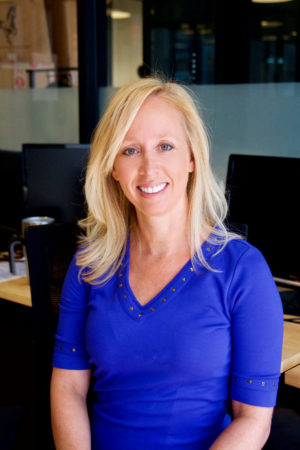 Candace Leak, Co-founder and CEO of Loanables
Candace Leak, Co-founder and CEO of Loanables
In 2014, Candace Leak was simply trying to plan a party for her parents to celebrate two big milestones: their 40th anniversary and their 60th birthdays. As a stay-at-home mom of two children, ages 2 and 4 at the time, she soon discovered how difficult something as seemingly simple as renting tables and chairs for the event was proving to be.
“I quickly realized all of the rental website companies literally required you to pick up the phone to find out what was available and how much it would cost,” recalls Leak, a self-described “Amazon mom.” “I found the process of trying to call around painful, especially in this day and age. Making telephone calls with children at home is almost impossible. I kept thinking, ‘I can’t believe this is how an industry still works in 2014. I can purchase anything I want and have it delivered, but that is not an option for rentals.’ ”
In a world in which frictionless buying is the norm—allowing shoppers to go online and make purchases from Amazon or any number of other online retailers with plenty of options to compare, get free delivery and expedite purchases—Leak was baffled the rental industry didn’t offer the same conveniences. At first, she considered simply buying tables and chairs for her planned event. But familiar with the startling overconsumption statistics in the United States, the thought of purchasing tables and chairs she would only use once weighed on her. After making numerous calls to various rental companies, she grew frustrated that some companies had tables while others only had chairs. Since her order was too small to qualify for delivery, she then had to load her kids into the Suburban Friday afternoon to pick up rentals at a warehouse on the other side of town and deal with the hassle of returning the rentals Monday.
It was an eye-opening revelation, and Leak thought someone should fix it. She just didn’t think she would be the person to do it.
“I am an entrepreneur at heart, but I did not think it would be me to fix it,” says Leak, who owned a pet-product business before selling it to stay home with her kids. “The company I had before wasn’t tech-related, so I didn’t think I had the expertise to create a technology solution.”
Then she thought about what she would say to her own children.
As a parent, Leak has always encouraged her son, now 8, and her daughter, now 6, to avoid saying “I can’t.”
“Here I was with all of these reasons that I can’t do it: I have no education in technology. I don’t have time with my kids at home,” she recalls. “But I thought to myself, ‘What if this was my child telling me all these reasons why they can’t do it? What would I say back to them?’ ”
Leak knew she would tell them they could do it, that they shouldn’t limit themselves.
“Then I thought, ‘I am going to do this. I am going to model that behavior for my children,’ ” she says.
Leak began to get excited about her idea, not just about the entrepreneurial aspect and the convenience her new venture would bring users, but also because of the potential impact her long-term vision of frictionless renting could eventually have on reducing overconsumption. In the future, Leak says the Loanables website will allow shoppers to rent any item they use less than three times per year.
Launched last year, Loanables’ database already includes more than 200 rental companies in Austin, enabling customers to shop an array of Austin rental companies in one place. With growth occurring each month and strong repeat-clientele numbers proving Loanables is offering a solution shoppers need, the company brought on four full-time employees and two interns, with plans to add more in the near future. But as with most new businesses, launching Loanables didn’t come without its challenges, spanning everything from delays in building the product to communication barriers with developers. Finally, Leak made the decision to hire a technical co-founder and turned to longtime business acquaintance Anthony Chen, who brought with him about two decades of technology experience.
“It has made all the difference in the world,” Leak says. “Our team is very diverse and comes from all backgrounds. I found you really need that diversity on a team to build the best product.”
So, what’s her advice for other budding entrepreneurs?
“Do it,” Leak says. “And for people with children, I would tell them to ask themselves what they would want their children to do and make the decision they would want their children to make. I am always saying things to my kids like, ‘Life is too short,’ or, ‘You’re going to regret it if you don’t do it.’ I’ve learned to talk to myself like I am talking to my children.”
Shanna Konetzke, Founder and CEO of Wholearth Enterprises VR
Always believe in your dream. Always believe in yourself and never let someone else’s “no” discourage you to the 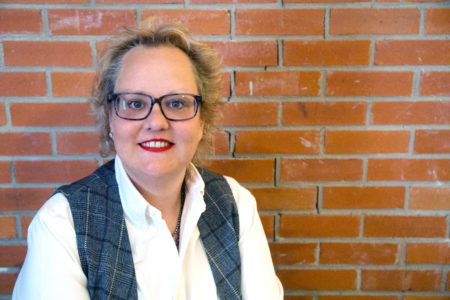 point of quitting. These are just a couple of the guiding principles that helped Shanna Konetzke combine her passions for education, health care and technology into an impactful business. She created the next generation of educational platforms for medical students by using virtual reality, augmented reality and haptic feedback gloves.
point of quitting. These are just a couple of the guiding principles that helped Shanna Konetzke combine her passions for education, health care and technology into an impactful business. She created the next generation of educational platforms for medical students by using virtual reality, augmented reality and haptic feedback gloves.
“There will always [be]someone who says this project is too big or is too out of reach,” says Konetzke, CEO of Wholearth Enterprises VR, the virtual-reality company she founded in La Grange, Texas, two years ago. “I never believed it for a second.
I know this is a big project, but I also know in my heart that Wholearth can change these simulations and change the way health care is done.”
Wholearth Enterprises VR is evolving health-care education into a new reality, with the mission to successfully develop the first mixed-reality education-and-research institution that enables collaborations with health-care institutions throughout the world. The project is still in the early design phase of development, and because cutting-edge technology is expensive, Konetzke says the company continues to look for like-minded long-term investment partners.
Utilizing a disruptive health-care e-learning platform using mixed reality, haptics, artificial intelligence and other new technologies on a global collaborative network, Wholearth Enterprises VR will provide educational simulations, yielding repetitive learning and increased retention and knowledge for medical students.
Konetzke, who has worked in the health-care field for 20 years, began her career as an X-ray technician, providing mammograms, breast imaging and CAT scans. She rewrote breast-imaging curriculums and mammography programs for two community colleges after graduating from the University of Texas Health Science Center at Houston. In 2010, Konetzke stared her first tech business, born out of her love for video games. It eventually led to the idea that education could be facilitated through video games. Today, Wholearth Enterprises VR is an e-learning platform for medical training, a virtual-reality medical school based on a Level 1 trauma center that uses virtual-reality simulations to help educate student doctors and allied health professionals.
The technology Konetzke works with involves a virtual-reality headset used with gloves that mimic force feedback, enabling students to feel what they are learning, which she says is a crucial component of medical training. Created from her love of education, health care and technology, the company aspires to provide a fully functioning health-care and research- learning platform.
“Wholearth VR believes the new realities and availabilities using disruptive learning procedures will increase repetitive learning skills, giving students access to the hard-to-learn but lifesaving procedures they might not see in their clinical environments,” Konetzke explains.
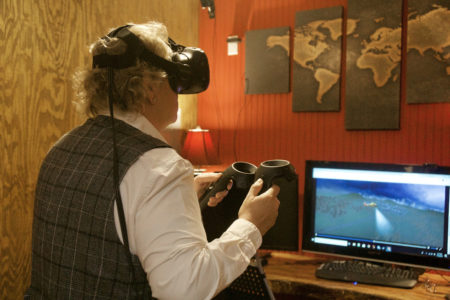 For example, the global e-learning medical platform allows students to use a virtual-reality body in lieu of studying the anatomy of cadavers in a lab. The platform also allows for simulations for dangerous procedures that aren’t commonly seen in clinical settings, giving students a hands-on approach to learning about these difficult procedures and making it possible to conduct them repetitively on the Wholearth Enterprises VR platform.
For example, the global e-learning medical platform allows students to use a virtual-reality body in lieu of studying the anatomy of cadavers in a lab. The platform also allows for simulations for dangerous procedures that aren’t commonly seen in clinical settings, giving students a hands-on approach to learning about these difficult procedures and making it possible to conduct them repetitively on the Wholearth Enterprises VR platform.
“The students are improving their education so that when it comes to doing these procedures on a live patient, they have the experience from repetitive learning through VR simulations,” Konetzke says.
There’s a collaborative element to the platform too. Universities can have their own simulations and students will have the opportunity to come together with other students throughout the world to collaborate on medical research and training.
Konetzke recalls her exact aha moment. She was working in an emergency department and talking with an ER physician about how she could pull her passions together.
“I thought, ‘I can do this. I can change the way medical students are trained,’ ” Konetzke says. “It all began as a one-time simulation, and it has evolved into a global platform.”
Mojdeh Gharbi, Co-owner and Vice President of Marketing and Operations for Certain Affinity
One of the best pieces of advice Mojdeh Gharbi has to offer others is not to let fear get in the way of success. 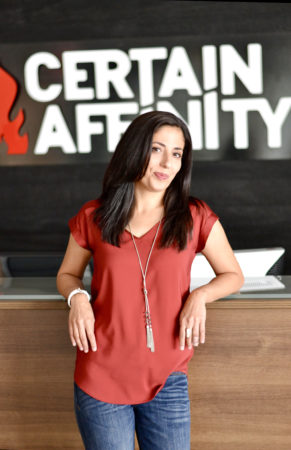
“A lot of times, people talk themselves out of opportunities just because of fear, but you have to be bold,” she says. “Being able to take chances and being fearless is very important. Don’t be afraid. Everyone fails and everyone learns from their mistakes, but everyone starts from someplace.”
Gharbi, who immigrated to the U.S. with her family from Iran when she was just 11, credits much of her professional success in STEM-related fields to the encouragement and support she received from talented industry leaders and mentors, as well as her own parents, who served as her first entrepreneurial role models.
“Our parents always encouraged my sister and I to do our best and become anything we wanted to be,” she says. “I always enjoyed math and science, and it played an important part in our lives growing up.”
In fact, when Gharbi’s family moved to the U.S., they settled on Austin so her sister could study engineering at the University of Texas. Gharbi attended what was then LBJ High School Science Academy before majoring in biology at UT, paying her way through college by working for her family’s business.
“It was at that time I realized I wanted to get a degree that would be more helpful with what I was doing, so I changed majors to advertising and business,” Gharbi says. “The day I changed majors, my mom cried because she really wanted [me to be]a heart surgeon, and my dad got excited since he was a businessman.”
While Gharbi’s professional path deviated from her initial dreams of becoming a doctor, her diverse career, which includes more than 20 years of experience in tech, gaming, advertising and real estate for companies spanning Leo Burnett to Microsoft, is one she couldn’t be more proud of.
Today, Gharbi oversees the business and operational success of Certain Affinity, a bootstrap startup founded in 2006 by her husband, Max Hoberman, that is now the largest independent game developer in Austin and the second-largest in the state, with more than 140 full-time employees. The highly prolific studio has been a lead developer or co- developer of more than 25 products across 10 different franchises, with combined sales of more than 100 million units. The company is now considered the go-to co-development partner for AAA action titles, with recent contributions to such powerhouses in the gaming field as “World of Tanks,” “Call of Duty” and “Doom.”
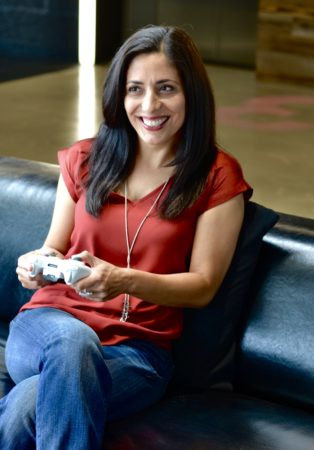 As Certain Affinity’s vice president of marketing and operations, Gharbi ensures the company hits its overall business, people and revenue goals, as well as long-term company objectives. Not only has Gharbi continued to break stereotypes as a Persian-American Middle Eastern woman in both the tech and video-gaming industries, but she also enjoys working in a profession that mixes STEM, creativity and business.
As Certain Affinity’s vice president of marketing and operations, Gharbi ensures the company hits its overall business, people and revenue goals, as well as long-term company objectives. Not only has Gharbi continued to break stereotypes as a Persian-American Middle Eastern woman in both the tech and video-gaming industries, but she also enjoys working in a profession that mixes STEM, creativity and business.
“It is one of a few industries where you see all of these disciplines come together,” Gharbi says. “Gaming is on the edge of innovation as it relates to technology and human interaction. It’s a pioneer in many ways to pave the path on how technology is applied in different industries and different problems.”
In addition to her role at Certain Affinity, Gharbi has a passion for empowering others, helping the local community and other businesses, and advocating for initiatives in support of economic growth and education. Most recently, she worked with Capital IDEA, as well as with Austin Community College on its tech-education program in an effort to create more opportunity for lower- income individuals to move into tech. She’s also been advocating for initiatives that support mandatory sick pay, job creation, economic development and small-business support in Austin.
“I love what I do and do what I love,” Gharbi says. “I believe that is critical to individual success.”
